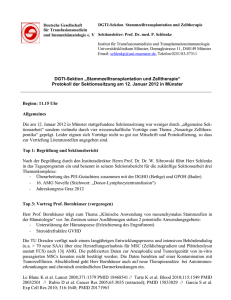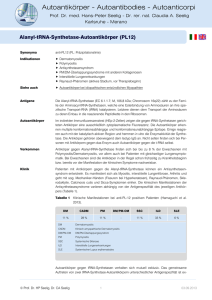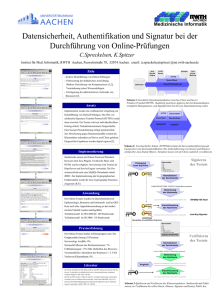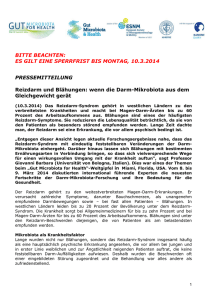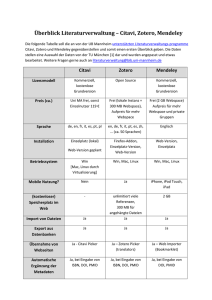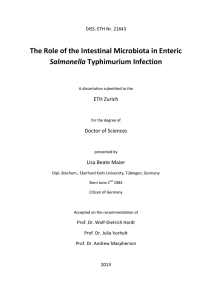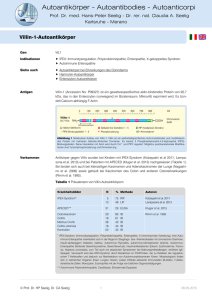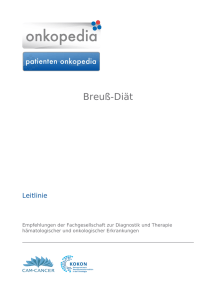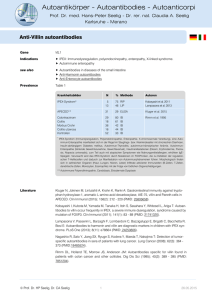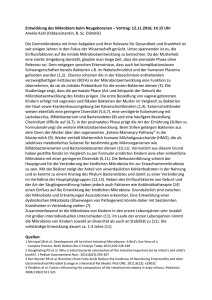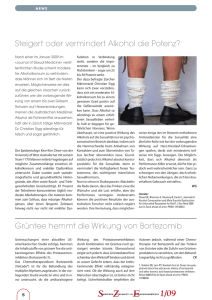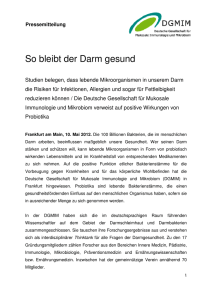Freund oder Feind?
Werbung
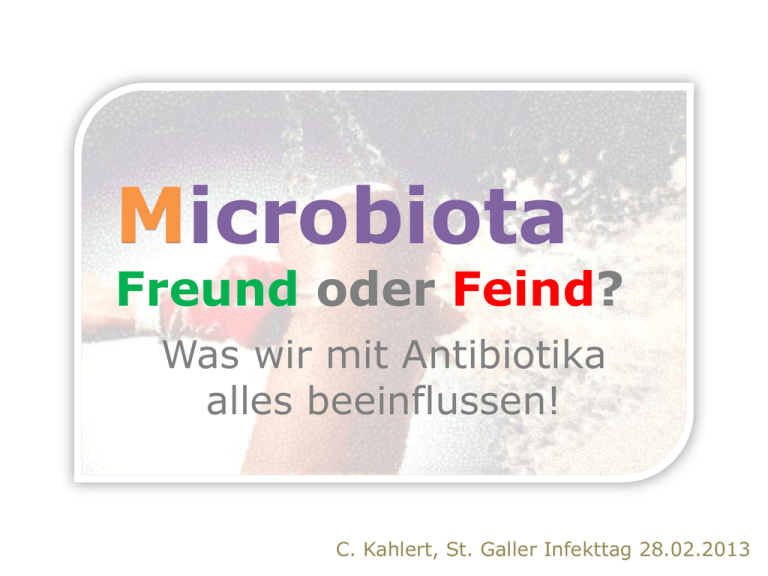
M Microbiota Freund oder Feind? Was wir mit Antibiotika alles beeinflussen! C. Kahlert, St. Galler Infekttag 28.02.2013 HinterFragen Microbiom - ein neues (bisher vergessenes) Organ? Microbiota – Freund oder Feind? Microbiota in der Praxis? Microbiom – das vergessene Organ? Entdeckung • Historisch „Normalflora“ als Blackbox • Technik – DNA Sequenzierung (z.B. 16s rDNA) und Datenbanken (Bioinformatik) • Wissenschaft – HMP (USA), MetaHIT (Europa) • Microbiom als „Organ“ -> „Microbiomologie“ To characterize the diversity of microbial life on Earth Who is who? TREND! #GFMH2013 http://www.gutmicrobiotaforhealth.com Microbiom – ein neues, bisher vergessenes Organ? • Definitiv ein Trend, sicher nicht nur Hype! • Microbiom: Total aller Mikroorganismen (Microbiota) mit Genetik und Stoffwechsel • Microbiomologie • Metagenom («our second genotype»)! • Metabolom/-transkriptom (Plasmametabolite) • Pathophysiologische Grundlage bisher ätiologisch weniger gut zugänglicher Krankheiten? Microbiota – Freund oder Feind Cho 2012, Nat Rev Genet, PMID 22411464 Einfluss auf Zusammensetzung Ley 2011, Annu Rev Microbiol, PMID 21682646 Gut, 2013, PMID 22730468 In unserem Colon leben... 1. überwiegend grampositive Bakterien 2. überwiegend gramnegative Bakterien 3. individuell überwiegen grampositive oder gramnegative Bakterien Variabilität monozygote Zwillinge Turnbaugh 2009, Nature, PMID 19043404 Taxonomie Bakterien Gattung: B. fragilis 2012 Wikipedia Entwicklung Metagenom -> Lactatverwertung planzl. Glykane „adulte Microbiota“ mit ca. 2.5 Jahre Clemente 2012, Cell, PMID 22424233 HMP, http://youtu.be/Pb272zsixSQ Ernährung und Gesundheit im Alter; Rolle der Microbiota Claesson 2012, Nature, PMID 22797518 Microbiota, Nutzen • Nährstoffe und Energie (Metabolite, SCFA = short chain fatty acids) +10% Energie • Schutz (Kolonisationsresistenz) • Zelldifferenzierung (Epithel, zelluläre Immunität) • Partnerwahl (!) • Immunstimulation/Immunmodulation Costello 2012, Science, PMID 22674335 Einfluss auf Immunfunktionen • IgA Bildung • Epithel (Gewebearchitektur) – PRR (pathogen recognition receptors) • TLR = MAMP Sensor (microbe-associated molecular patterns; z.b. LPS, PG, Flaggelin) CAVE: TLR-Mutationen -> Inflammation ↑ • NLR (Inflammasom = DAMP Sensor) – Paneth-Zellen -> AMPs (antimicrobial peptides) • T-Zell-Differenzierung Veldhoen 2012, Nat Rev Immunol, PMID 23007570 Lee 2010, Science, PMID 21205662 Krankheiten und Microbiota Adipositas -> Transplantation! Allergien, Asthma Infektdiathese: Influenza, TBC, CD Autoimmunerkrankungen (M. Crohn, Diabetes, MS, RA etc.) • Adenocarcinom Ösophagus, Colon-CA • Autismus, Depression (can we vaccinate against depression? PMID 22507593) • Hypertonie? • • • • Microbiota – Freund oder Feind? Freund UND Feind, je nach Kontext! Erkenntnisse explodieren Ab ca. 2 Jahre stabile Zusammensetzung Reichtum und Vielfalt wahrscheinlich wesentlich für Homöostase • Zusammenhang mit verschiedenen auch extraintestinalen Erkrankungen • Einflussnahme über Ernährung und Antibiotikaeinsatz • • • • Microbiota in der Praxis? Probiotika? 1. Sind bei definierten Krankheiten wirksam, weshalb ich Probiotika einsetze 2. Sind möglicherweise wirksam, ich setzte sie aber nicht ein 3. Sind nicht wirksam, weshalb ich Probiotika auch nicht einsetze 4. Sind immer gut Abreu 2012, PMID 22972842 Probiotika, Allgmeines • Lactobacillus rhamnosus et al, Saccharomyces boulardii, Bifidobakterien • Joghurt versus Probiotika • Präbiotika, Synbiotika und Postbiotika • Nahrungsergänzung, keine Arzneimittel • Anti-Inflammation (NF-kB, ROS), Zytoprotektion (tight-junctions, Apoptose) • Sicherheit Probiotika, Indikationen? • Therapie – akute Gastroenteritis – Clostridium difficile Colitis – Hepatische Encephalopathie NEIN • Prophylaxe – Antibiotika assoziierte Diarrhoe (NNT = 7) – IBD/UC, v.a. Pouchitis (NNT = 4) – FG, Prophylaxe NEC • Ideen VERSUCH – Cytoprotection Strahlentherapie – Turbo-Probiotic – Pharmabiotic ? Ciorba 2012, Clin Gastroenterol Hepatol, PMID 22504002 ANTIBIOTIKA Borody 2011, PMID 22183182 >90% Therapieerfolg! 2013, van Nood, PMID 23323867 FG, nekrotisierende Enterokolitis 2012 Wang, PMID 22244424 Forschung KSSG/OKS Modulation of inflammation by Lactobacillus rhamnosus GG in pediatric patients with cystic fibrosis • Setting: klinische Studie OKS (Patienten, Pneumologie), KSSG (Labor Infektiologie & Spitalhygiene) • Hypothese: LGG moduliert Microbiota im Darm, vermindert intestinale und pulmonale Inflammation, verbessert FEV1 • Outcome: pulmonale Inflammation Pascal Müller, Christian Kahlert Microbiota in der Praxis • Probiotika, Präbiotika und Synbiotika in der Prophylaxe • Antibiotika als „Raketenangriff“ auf Microbiota • Fäkaltransplantation bei schwerer rezidivierender C. diff. Colitis • Weitere Indikationen Bakteriotherapie (Hypertonie)? • Probiotika bei FG NEC • Ernährung? ANTIBIOTIKA Primum nihil nocere
